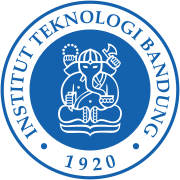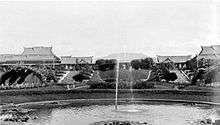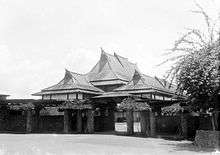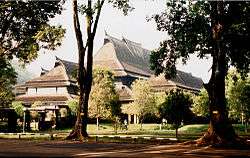Bandung Institute of Technology
The Bandung Institute of Technology (Indonesian: Institut Teknologi Bandung, abbreviated as ITB) is a state, coeducational research university located in Bandung, Indonesia. Established in 1920, ITB is the oldest and first technology-oriented university in Indonesia.[4]
Institut Teknologi Bandung | |
 | |
Former name | Technische Hoogeschool te Bandoeng (Dutch) |
|---|---|
| Motto | In Harmonia Progressio |
Motto in English | Progress in Harmony |
| Type | Public university |
| Established | 3 July 1920 (as Technische Hoogeschool te Bandoeng) 2 March 1959 (as Institut Teknologi Bandung) |
| Rector | Prof. Reini Wirahadikusumah, Ph.D. |
Academic staff | 1,207 (as of 2014):[1] Undergraduate: 19 (1.57%)[1] Graduate: 300 (24.85%)[1] Doctorate: 888 (73.57%)[1] |
| Students | 19,747 (as of 2014)[1] Undergrad : 14,320 (as of 2014)[1] Postgrad : 4,776 (as of 2014)[1] Doctoral : 651 (as of 2014)[1] |
| Location | Jl. Ganesha 10, Bandung , 6.890903°S 107.610378°E |
| Campus | Urban 795,646 m2[1] |
| Colors | Deep Cobalt Blue [2][3] |
| Affiliations | ABET, ASAIHL, AUN, EBA Consortium, ASEA UNINET, Global E3, AOTULE, SEATUC |
| Mascot | Ganesha |
| Website | www.itb.ac.id |
 | |
ITB was considered the top choice among Indonesia's high school students in 2006 and has been credited as one of the most prestigious universities in Indonesia, together with Gadjah Mada University and University of Indonesia.[5][6] Sukarno, the first president of the Republic of Indonesia, earned his engineering degree in civil engineering from ITB. Furthermore, B. J. Habibie, the third president of Indonesia, also spent a year in the mechanical engineering department of ITB and is officially recognized as a graduate.
The university cultivates professional and social activities by supporting its students' unions, the student government councils that exist in every department. Each students' union has its own distinctly designed jacket that, among other traditions, serves as part of its member identity. There are also a number of student activity units/clubs supporting ITB student interests in rounding out their educational experience. It is not uncommon that the students and alumni are identified by the clubs to which they belong (or used to belong) at ITB, in addition to their class year and major.
As of 2020, ITB had thirteen undergraduate study programs been internationally accredited from an independent U.S.-based accrediting institution, Accreditation Board for Engineering and Technology. The thirteen study programs are Electrical Engineering, Informatics, Chemical Engineering, Engineering Physics, Industrial Engineering, Engineering Management, Ocean Engineering, Petroleum Engineering, Civil Engineering, Environmental Engineering, Mining Engineering, Electrical Power Engineering, and Telecommunication Engineering[7].
ITB's march "Mars ITB" and hymn "Hymne ITB" were arranged by a former professor, Prof. Dr. Sudjoko Danoesoebrata.[8]
Historical Background


ITB traces its origin to de Technische Hoogeschool te Bandoeng (THB) which was founded by the patronage of Karel Albert Rudolf Bosscha, a Bandung plantation owner, industrialist and philanthropist, and the support from the Dutch colonial administration, to meet the needs of technical resources in Dutch East Indies. The school building was designed in 1918 by a Dutch architect named Henri Maclaine Pont, who was inspired by Indonesian vernacular architecture and blending it with modern elements.[9] When the school opened its door for the first time on 3 July 1920, it only had one department namely 'de Faculteit van Technische Wetenschap' (Faculty of Technical Science) and one academic major of 'de afdeeling der Weg en Waterbouw' (the department of Road and Water resources engineering).
During the Japanese occupation in 1942-1945, the institute was renamed Kōgyō Daigaku (工業大学, 'Industrial University'). When Indonesia declared its independence the campus was renamed "Sekolah Tinggi Teknik" (STT) (Technical High School) in 1945.[10] However a year later the Netherlands returned to Indonesia and took directorship of the campus, it was used as "Nood-Universiteit van Nederlandsch Indië" (emergency university of Dutch East Indies). Later in 1947 the campus housed the Faculteit van Technische Wetenschap (faculty of engineering) and Faculteit van Exacte Wetenschap (faculty of science) which is under Universiteit van Indonesië (later University of Indonesia). In 1950 after the Netherlands left Indonesia, the university became faculty of engineering and faculty of natural sciences, under University of Indonesia.[11]
On 2 March 1959, the 2 faculty of University of Indonesia in Bandung was declared a separate academic entity. On Government Regulation (Peraturan Pemerintah) No. 155/2000, ITB was declared a Legal Enterprise (Badan Hukum). Bandung Institute of Technology was founded for higher learning in natural sciences, technologies, and fine arts.[12]
Campus

The ITB main campus, to the north of the downtown Bandung, and its other campuses, cover a total area of about 770,000 square metres.[13]
Students and faculty housing, and administrative headquarters are not on the main campus, but are located within proximity. Facilities on the campus include book shops, a post office, student cafeteria and medical clinic.
In addition to lecture rooms, laboratories, workshops and studios, ITB has an art gallery, sports facilities and a student activities' centre. For implementation of academic and research activities there are seven academic support facilities, namely, the Central Library (with approximately 150,000 books and 1000 journal titles) on campus, Sports Centre, Language Centre and the Bosscha Observatory (a facility of the Department of Astronomy) in Lembang, 11 kilometres to the north of Bandung.[14]
Academics
Quality and Reputation
ITB is ranked 313th at 2021 QS Global Ranking.[15] ITB is considered to have the highest selectivity in the field of science and engineering in the SNMPTN (nationwide state university entrance test) in 2009 from 422,159 examinees competing for its limited 2,000 seats.[16]
The passing grades required to enter its top four favorite faculties i.e., Faculty of Industrial Technology (FTI), Faculty of Mechanical and Aerospace Engineering (FTMD), School of Electrical Engineering and Informatics (STEI) and Faculty of Mining and Petroleum Engineering (FTTM) are the highest in the nationwide state university entrance test (SNMPTN & SBMPTN). Its business school, School of Business and Management (SBM) is considered as the most prestigious and elite business school in Indonesia and regarded as the best business school in Indonesia by eduniversal ranking, global brand magazine and SWA Magazine, the most popular business magazine in Indonesia.[17]
Research
According to the rector of ITB, ITB had built an eight-storey mining research centre for both national and international research such as research on oil reservoirs, production optimisation, geological exploitation and coal exploitation development worth Rp110 billion ($12.1 million).[18]
Faculties and Programs
Consisting of 12 faculties and schools, ITB is not only focused on the fields of STEM but also arts and business management which have been recognized at national and international levels.[19]
Natural Sciences Cluster
| Faculty of Mathematics and Natural Sciences (FMNS)
Indonesian: Fakultas Matematika dan Ilmu Pengetahuan Alam (FMIPA) |
| School of Life Sciences and Technology - Science Program (SLST-S)
Indonesian: Sekolah Ilmu dan Teknologi Hayati - Program Sains (SITH-S) |
Pharmacy Cluster
| School of Pharmacy (SP)
Indonesian: Sekolah Farmasi (SF)
|
Engineering Cluster
| School of Life Sciences and Technology - Engineering Program (SLST-E)
Indonesian: Sekolah Ilmu dan Teknologi Hayati - Program Rekayasa (SITH-R)
|
| Faculty of Earth Sciences and Technology (FEST)
Indonesian: Fakultas Ilmu dan Teknologi Kebumian (FITB)
|
| Faculty of Mining and Petroleum Engineering (FMPE)
Indonesian: Fakultas Teknik Pertambangan dan Perminyakan (FTTM)
|
| Faculty of Industrial Technology (FIT)
Indonesian: Fakultas Teknologi Industri (FTI)
|
| School of Electrical Engineering and Informatics (SEEI)
Indonesian: Sekolah Teknik Elektro dan Informatika (STEI)
|
| Faculty of Mechanical and Aerospace Engineering (FMAE)
Indonesian: Fakultas Teknik Mesin dan Dirgantara (FTMD)
|
| Faculty of Civil and Environmental Engineering (FCEE)
Indonesian: Fakultas Teknik Sipil dan Lingkungan (FTSL)
|
| School of Architecture, Planning and Policy Development (SAPPD)
Indonesian: Sekolah Arsitektur, Perancangan, dan Pengembangan Kebijakan (SAPPK)
|
Social Sciences, Arts, and Humanities Cluster
| Faculty of Art and Design (FAD)
Indonesian: Fakultas Seni Rupa dan Desain (FSRD)
|
| School of Business and Management (SBM)
Indonesian: Sekolah Bisnis dan Manajemen (SBM) |
Notable people and alumni
ITB has produced more than 120,000 alumni who play a significant role in nation-building, among others are:[20]
- Aburizal Bakrie, an Indonesian entrepreneur and politician, former chairman of Bakrie Group, former Indonesian Coordinating Minister for People's Welfare (2005–2009), Chairman of Golkar Party (2009–present), the richest person in Indonesia (Forbes 2007).
- Achmad Zaky, CEO & co-Founder of Bukalapak.com.
- Albert Yonathan Setyawan, Contemporary ceramic artist based in Japan.[21]
- Andi Wijaya, Founder and chief commissioner of PT. Prodia.
- Arcandra Tahar, Former Minister and current Deputy Minister of Energy and Natural Resources, Indonesia.[22]
- Betti Alisjahbana, Indonesian businesswoman, former chief of IBM Indonesia.
- Baharuddin Jusuf Habibie, the third President of Indonesia (1998–1999).[23]
- Ciputra, Indonesian real estate tycoon, top 15 the richest people in Indonesia 2016.
- Djoko Santoso, Former President of Association of Indonesian Geophysicist (1998-2000), Former Rector of ITB (2005-2010), Former Rector of UI (2012-2013), Director General of Higher Education.
- Djuanda Kartawidjaja, Indonesian Prime Minister (1957–1963).
- Eddie Lembong, Founder of PT. Pharos Indonesia.
- Fadel Muhammad, Governor of Gorontalo (2001–2009), Minister for Maritime and Fisheries (2009–2011), Deputy Chairman of Golkar Party.
- Ginandjar Kartasasmita, former Speaker of Indonesian Regional Representative Council (DPD-RI), former Indonesian Coordinating Minister of Economy.
- Harry Roesli, Indonesian artist and musician.
- Hartono Rekso Dharsono, the first Secretary General of ASEAN.
- Hatta Rajasa, Indonesian Coordinating Minister of Economy (2009–2014).
- Herman Johannes, Indonesian professor, scientist and politician, national hero, former dean of Gadjah Mada University.
- Hokky Situngkir, Indonesian scientist.
- Jahja Santoso, Founder and CEO of Sanbe Farma.
- Jero Wacik, Indonesian Minister of Culture and Tourism (2004–2011).
- Jesica Fitriana Martasari, Puteri Indonesia 2019 2nd runner-up and Miss Supranational 2019 2nd runner-up.
- Joko Anwar, film director.
- Jusman Syafii Djamal, former Indonesian Minister of Transportation, former CEO of Dirgantara Indonesia, an Indonesian aircraft manufacturing firm, President Commissioner PT. Garuda Indonesia, the biggest Indonesia stateowned airlines company.
- Karen Agustiawan, former President of Pertamina, the largest Indonesian Oil Company.
- Karlina Leksono Supelli, Indonesian philosopher and astronomer. One of Indonesia's first female astronomers.
- Karno Barkah, Indonesian aviation pioneer, recipient of the French Légion d'honneur, former President Director of the Soekarno-Hatta International Airport.
- Kusmayanto Kadiman, former Minister of Research and Technology of Indonesia
- Laksamana Sukardi, former Indonesian minister of State-owned Enterprises Management, Indonesian Politician, banker
- Mangunwijaya, Indonesian architect, writer, and Catholic religious leader.
- Maria Selena, winner of Puteri Indonesia 2011 and represent Indonesia in Miss Universe 2012.
- Merlyna Lim, Indonesian professor, internationally recognized Science & Technology Studies scholar.
- Nabiel Makarim, Indonesian Minister of the Environment (2001–2004)
- Nurhayati Subakat, Founder and CEO of Paragon Technology and Innovation.
- Pantur Silaban, Indonesian physicist in theory of relativity.
- Pramono Anung, Indonesian Cabinet Secretary (2015–present).
- Purnomo Yusgiantoro, Minister of Defense (2009–present), Minister of Energy and Mineral Resources (2000–2009), former President and Secretary General of OPEC
- Rachmat Witoelar, former Indonesian Minister of Environment, Special Envoy on Climate Change, Head of National Council on Climate Change.
- Ridwan Kamil, Governor of West Java (2018–present).
- Rinaldi Firmansyah, Former CEO of Telkom Indonesia, the largest fixed-line and wireless telecommunication operator firm in Indonesia.
- Rizal Ramli, former Indonesian Coordinating Minister of Economy, founder and chairman of ECONIT Advisory Group, an independent economic think-tank.
- Roby Muhamad, Indonesian scientist famous for his work in social networking and small-world networks.[24]
- Rudy Soetikno, Founder of Dexa Group.
- Samaun Samadikun, Indonesian scientist dedicated to the development of electronics[25]
- Soekarno, The First President of Indonesia (1945-1967).[26]
- Taufik Akbar, Indonesian astronaut.
- Tjokorda Raka Sukawati, inventor of Sosrobahu construction technique.
References
- Webmaster Team, Unit Sumber Daya Informasi ITB. "ITB - Fakta dan Angka". Archived from the original on 19 July 2015. Retrieved 25 July 2015.
- "Siskumdang - ITB - Document Details - SK Rektor No. 324/SK/K01/OT/2008". itb.ac.id. 18 December 2012. Archived from the original on 18 December 2012. Retrieved 10 April 2018.
- CMYK 100,70,0,0 http://www.colorhexa.com/004dff
- "Usia ITB Genap 100 Tahun, Begini Sejarah Singkatnya". Bandung Kita (in Indonesian). 2020-07-03. Retrieved 2020-08-01.
- "707 Siswa Pandai Tapi Tak Mampu Lulus SPMB" (online archive in Indonesian). Sinar Indonesia Baru. 6 August 2006. Retrieved 2006-11-02.
- "Mencermati Peringkat Nilai Hasil Seleksi Penerimaan Mahasiswa Baru (SPMB) 2004" (online archive in Indonesian). Harian Jawa Pos. 13 August 2004. Retrieved 2006-11-02.
- "Status Akreditasi Internasional Prodi ITB – Satuan Penjaminan Mutu". Retrieved 2020-06-10.
- "Hymne dan Mars ITB Itu Tiada". Tempo Interaktif. 26 August 2006. Archived from the original (online archive in Indonesian) on 28 January 2007. Retrieved 4 November 2006.
- The quest for the ultimate architecture Indonesia in the late colonial period , pac-nl.org
- "Usia ITB Genap 100 Tahun, Begini Sejarah Singkatnya". Bandung Kita (in Indonesian). 2020-07-03. Retrieved 2020-07-25.
- "About Institut Teknologi Bandung – Partnership Bureau". Retrieved 2020-07-25.
- "PP 155-2000::Penetapan ITB sebagai BHMN". ngada.org (in Indonesian). Retrieved 2020-07-25.
- ITB, Webmaster Team, Direktorat Sistem dan Teknologi Informasi. "Fakta dan Angka -". Institut Teknologi Bandung (in Indonesian). Retrieved 2020-07-25.
- Bosscha, Observatorium. "Observatorium Bosscha". Observatorium Bosscha (in Indonesian). Retrieved 2020-07-25.
- https://www.topuniversities.com/universities/bandung-institute-technology-itb#wurs
- http://sosialbudaya.tvone.co.id/berita/view/19209/2009/07/31/sebanyak_92511_calon_mahasiswa_lolos_snmptn_2009/%5B%5D
- Peringkat Ranking Sekolah Bisnis Terbaik di Indonesia | blog strategi + manajemen
- "ITB plans Rp 110b research center". December 2, 2011.
- ITB, Webmaster Team, Direktorat Sistem dan Teknologi Informasi. "Fakultas dan Sekolah -". Institut Teknologi Bandung (in Indonesian). Retrieved 2020-07-25.
- inspiraloka (2019-08-11). "100 Alumni ITB (Institut Teknologi Bandung) yang Paling Terkenal". Inspiraloka (in Indonesian). Retrieved 2020-07-25.
- "ALBERT YONATHAN SETYAWAN". www.changeperformingarts.com. Retrieved 2020-06-21.
- "Ignasius Jonan dan Arcandra Tahar diangkat jadi Menteri dan Wakil Menteri ESDM". BBC Indonesia. Retrieved 10 April 2018.
- "Vice President - President of Indonesia Collection Website". kepustakaan-presiden.perpusnas.go.id. Retrieved 2020-06-22.
- Ketut Krisna Wijaya, This CEO left Acer to build a social network in Indonesia, and just raised $3M. Tech In Asia, 1 September 2015. Accessed 25 June 2018.
- Prof. Samaun Samadikun Archived 2008-11-20 at the Wayback Machine
- Wissema, J. G. (2009-01-01). Towards the Third Generation University: Managing the University in Transition. Edward Elgar Publishing. ISBN 978-1-84844-618-2.
External links
| Wikimedia Commons has media related to Bandung Institute of Technology. |